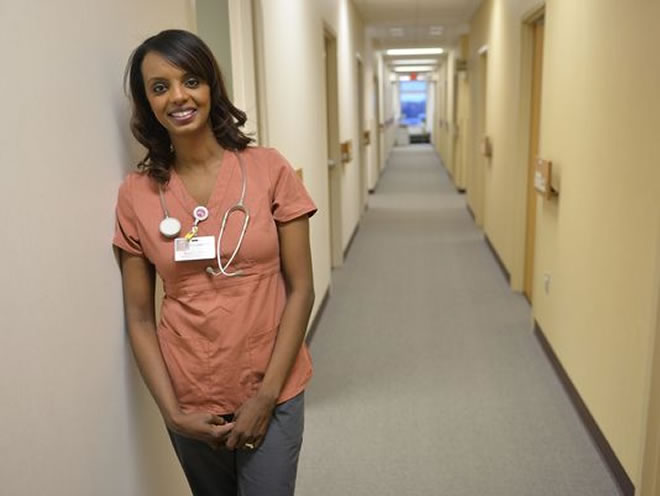
Hani Jacobson is an OB-GYN nurse at CentraCare Health Plaza. She moved to America from Mogadishu, Somalia when she was eight years old. Photo: Kimm Anderson

By Jake Laxen
Sunday, November 2, 2014
advertisements
It was 2005 and then 21-year-old Hani Jacobson was visiting family in St. Cloud.The Somali-American's stay was supposed to be temporary. But after filling in for her sister at her job at the Whitney Center, fate had other ideas.
"My first impression was she was beautiful, hard-working and smart," said her husband Nathan Jacobson.
Nathan was volunteering at Whitney Center when the two met. He grew up in Borup and initially came to the area to attend St. Cloud State University.
Hani and Nathan wed in March 2007. They now live in a north St. Cloud home with their three children: a 6-year-old son named Gabriel, a 3-year-old daughter named Layla and a 1-year-old son named Elijah.
"My first impression of Nathan is that he was really caring to newcomers, especially people from my community," Hani said. "He really cared about the new immigrants."
Hani also noticed an opportunity to make a difference in St. Cloud's growing Somali community.
She was born to an upper-middle class family in Mogadishu, Somalia, and escaped to refugee camps in Kenya when she was 7. It was 1991, and the Somali civil war had begun. She made it to the U.S. through the World Relief organization at age 9 in 1993 and grew up in an Atlanta suburb. Hani had also lived in Seattle and Nashville prior to coming to St. Cloud.
"I noticed there was a great need here for someone in the Somali community with an American education," Hani said. "Where I grew up by Atlanta, the people (had) left way earlier in the civil war. Most were wealthier, from Mogadishu and had an educational background. It was way easier for us to start lives as Americans.
"Whereas the immigrants who are coming to St. Cloud now were more like villagers or kids that grew up or were born in refugee camps."
Hani is now an OB-GYN nurse at CentraCare Health Plaza, working with women of all cultures. She previously worked with Somali students in the St. Cloud school district, and she helped teach Somalis English and basic computer skills at the Whitney Senior Center and the BRIDGE World Language Center in Waite Park.
Nathan teaches English as a Second Language courses at St. Cloud Technical & Community College.
"It's funny because my husband is kind of more known than I am among Somali people," Hani said.
Hani, who has worked regularly since she turned 16 to help support her parents and 11 siblings, accomplished a lifelong goal by attending college in St. Cloud.
While she's sacrificed her initial goal of supervising childbirth so she can spend more time with her family, Hani said she enjoys her current job working with pregnant women.
But her life in the U.S. hasn't always been as prosperous or as full of acceptance.
"Before the war, my dad worked really hard and we lived an upper-middle class life," Hani said. "After coming to America we thought: 'Everything is going to be great again. We are going to get our lives back.'
"But things were much harder than we anticipated."
Hani's family initially settled in Clarkston, Georgia, a popular relocation for the first wave of Somali civil war refugees.
"It was a predominately African-American community but they had never heard of Somalis or Somali people," Hani said. "It was like we weren't welcome."
Hani said Somalis were often bullied, including her brother who was once beaten into a coma at school.
"Fortunately, as time went on things got better," Hani said.
And after multiple stops and struggles, she's found the American dream in St. Cloud.
Growing up in 2 cultures
When you ask Nathan and Hani's 6-year-old son what his first name is, the answer depends on who is asking.
When it's Nathan's family from Borup or other English speakers asking, the son's response is "Gabriel."
When it's Hani's family from Mogadishu or members of the local Somali community, the son's response is "Jibril," which is the Arabic equivalent of Gabriel.
"He already knows the difference," Hani said. "Lately he's been noticing the two cultures."
Nathan and Hani hope their son takes the most positive qualities from each culture.